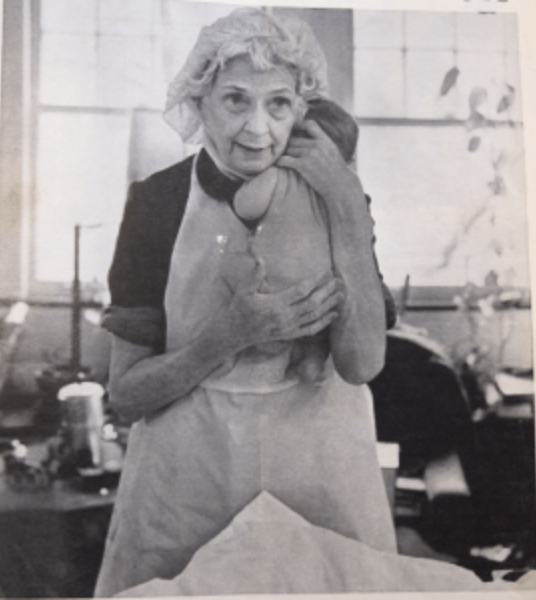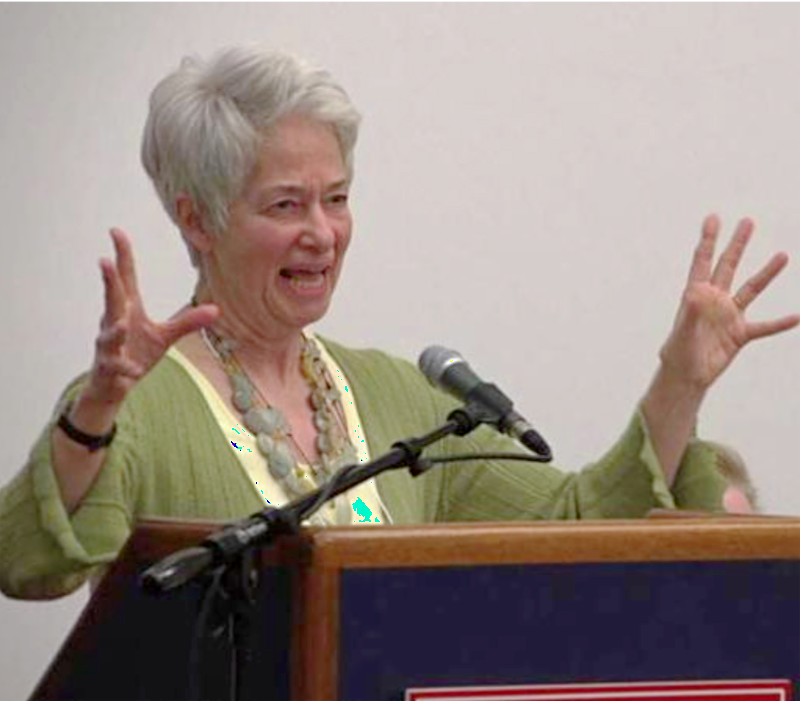|
|
|
|
|
|
| |
|
Title IX's 45th Anniversary
Reported by Jessica Kozik, WWHP
|
|
 |
| U.S. Rep. Patsy T. Mink,chief sponsor of Title IX. Photo by J. Curnow. |
 |
Title IX of the Education Amendments of 1972 was signed into law by President Richard Nixon on June 23rd, 1972, making this year its 45th anniversary. Representative Patsy T. Mink is recognized as the main author and sponsor of the amendment, and it was eventually renamed the Patsy T. Mink Equal Opportunity in Education Act in 2002 after her death. The amendment states that "No person in the United States shall, on the basis of sex, be excluded from participation in, be denied the benefits of, or be subjected to discrimination under any educational program or activity receiving Federal financial assistance."
The law was created and passed with the intention to eliminate the inequalities women faced in regard to education opportunities. The law applies to all institutions receiving federal financial assistance from the Department of Education, which, according to the website of the Department of Education, includes approximately 16,500 local school districts, 7,000 postsecondary institutions, as well as charter schools, for-profit schools, libraries, and museums.
Title IX is most commonly known for affecting opportunities for women in school athletics. The law requires schools to supply students with equal opportunities of participation, equal access to scholarships, and equal access to other benefits like equipment and facilities. This has opened doors for many women, however, this is only one aspect of the law.
Title IX also applies to admissions, sex education, employment, and sex-based harassment. Regarding harassment, schools are also responsible for working toward prevention, as well as for responding effectively to harassment when it does occur. Schools are held accountable for sexual assault and harassment, and must ensure that victims do not have to share spaces with their assailant. The law works to protect women and make them feel safe in their educational environments. Of course for that to happen the law needs to actively be enforced.
The Department of Education and Education Secretary Betsy DeVos' ability to properly enforce Title IX and effectively protect women has come into question lately. This month the National Women's Law Center filed a Freedom of Information Act lawsuit against the Department of Education. The NWLC, a non-profit women's rights advocate that investigates mishandlings of sexual violence, claims that the Department of Education improperly withheld documents concerning its enforcement of Title IX. Their complaint states, "The records are a matter of public concern. Without their release, students, families and legal service providers such as NWLC will be kept in the dark about whether and how [the Department of Education] enforces Title IX's protections for student survivors of sexual harassment, including rape. Without their release, victims will not know whether they can trust their government to enforce civil rights laws and intervene on their behalf."
Title IX and the 45 years of benefits it has brought women are definitely worth celebrating, but we must continue to hold our government accountable for upholding the law and protecting the rights and opportunities of women.
|
|
..............................................................................................................................................
|
Dr. Beatrice Tucker:
Pioneering Obstetrician to Chicago's Working Classes
Reported by Amy Laiken
 Born in October 1897, Beatrice Tucker knew early on that she wanted to be a doctor. Having observed her father, who practiced medicine without a license, she decided to get the academic training that would enable her to become a licensed physician. In her era, women were generally not welcome in the medical profession. Nevertheless, she started college at Bradley University, earned her undergraduate degree from the University of Chicago, and received her medical degree from Rush University.
During the early years of her career, Dr. Tucker worked in private practice and also in the field of public health. At age 35, she decided to switch to obstetrics.
Dr. Tucker secured a residency at Chicago Lying-In Hospital, under the direction of Dr. Joseph DeLee, an obstetrician who did not think highly of women doctors. Dr. Tucker said in 1979, "I sneaked in there to do my residency in 1929 when he was out of town, because he (Dr. DeLee) didn't believe in women doctors. When he came back, he was pretty sore about finding me there. But he got over it."
1
Dr. DeLee opened a facility that was geared to lower income obstetric patients, the Maxwell Street Dispensary, which was funded by the University of Chicago. When the university withdrew its support in the early 1930's, he maintained the Near West Side facility as Chicago Maternity Center (CMC), which emphasized home births. Dr. DeLee believed that home deliveries were a good option, particularly for lower income women. He recruited Dr. Tucker to work there after she completed her residency, and she became its director in 1932. The staff included nurses, residents, Dr. Tucker and her partner in the practice, Dr. Harry Benaron. The CMC provided the medical students and residents with obstetrical experience in the field, and, in turn, the hospital where they were trained provided the Center with backup if complications arose during a home delivery.
"
I remember interns and residents enjoyed going on deliveries with her because she showed them self confidence," said Laura Newman, a medical journalist and blogger who knew Dr. Tucker.
Dr. Tucker estimated that she and her staff delivered 100,000 babies in the 40 years she worked at the Chicago Maternity Center.2 In the early 1970's, Dr. Tucker and several women's health activists became aware that the CMC would be replaced by a women's hospital on the Near North Side. They formed WATCH (Women Act to Control Health Care), a group that included members of the Chicago Women's Liberation Union CWLU), in an attempt to save the Maternity Center. Two of the CWLU members made a film about the effort,
The Chicago Maternity Center Story. Ultimately, they did not prevail and the CMC closed at the end of 1973. Dr. Tucker had resigned from the Chicago Maternity Center earlier that year. In her later years, Dr. Tucker worked at a South Side clinic, and continued to preside over home births occasionally
.
"On a personal note, I learned so much from Dr. Tucker while making the CMC film that I was amazingly prepared for my first baby's birth -- an accidental home delivery! When I felt the baby's head drop onto my perineum I knew the baby would come at home. I relaxed and lay back on our bed as he came out in 3 contractions into his dad's hands."
~Sue Davenport, filmmaker, 1976 The Chicago Maternity Center Story (1976) Kartemquin Films.
In addition to being a pioneer as a woman who became a doctor in the earlier part of the 20th century, Dr. Tucker was also unusual in becoming an adoptive mother to two boys as a single woman. She delivered her own grandson in the late 1960's. Dr. Tucker died in 1984, just short of her 87th birthday.
1 Benzkofer, Stephan, "Saving the Children," Chicago Tribune, June 3, 2012
2 Benzkofer, op.cit.
|
|
..............................................................................................................................................
|
Heather Booth: Changing the World and
the Most Influential Person You Have Never Heard Of!
 This documentary by filmmaker Lilly Rivlin is playing to sold out audiences at selected theaters across the country. It was shown at the Gene Siskel Film Center in Chicago May 19-20, 2017.
Booth was a major force in founding the Chicago Women's Liberation Union, Jane Underground Abortion Service, the Action Committee for Decent Child Care, the Midwest Academy to teach women to be organizers, and many other organizations and actions. The film covers her childhood and experiences as a young adult that help shape her 50+ years of activism.
The Chicago Women's History Center co-sponsored the screening of the new film along with a reception and discussion. CWHC President Mary Ann Johnson and director of its "Documenting Women's Activism and Leadership in the Chicago Area, 1945-2000" project, commented:
"Understanding the work of Heather Booth and her lifetime of community organizing is important because it illuminates the often hidden history of grass-roots activism in the United States and its power to influence social change. Heather's unwavering commitment to social justice, from her college days in Chicago to her current work in the nation's capital, has kept her focused on the "prize" - creating social change and giving voice to the powerless - often at the expense of personal recognition and acclaim."
|
|
..............................................................................................................................................
|
Lily Liu, Keynote Speaker at
Retired Teachers Association of Chicago Luncheon
|
|
Left to right: Helen Ramirez-Odell, Lily Liu, Brigid Duffy Gerace and Jackie Kirley
|
Lily Liu, AARP Historian Emerita, was the keynote speaker at the spring luncheon of the Retired Teachers Association of Chicago on May 22, 2017 at the Hilton Chicago. She was a panelist at WWHP's program last fall on the life and legacy of Ethel Percy Andrus who founded AARP and the National Retired Teachers Association.
Liu noted that Percy Andrus' story has been lost to history although her work after retirement had a major impact on society. She thanked WWHP and RTAC for their events recognizing Andrus' work and achievements.
|
|
..............................................................................................................................................
|
|
|
|
| |
|